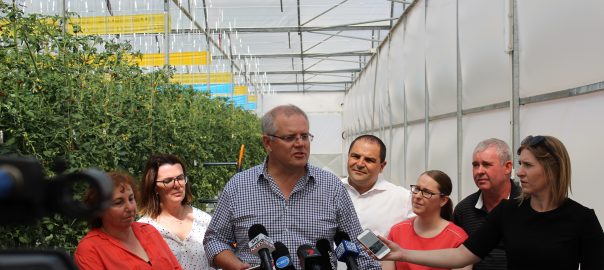Changes to the WHM Visa to benefit Barker farmers

Changes to two visa programs made by the Coalition Government will help resolve agricultural labour shortages in Barker.
Adjustments to the Working Holiday Maker (WHM) subclass 417 and 462 visa program have been designed to target genuine workforce shortages in regional Australia without displacing Australian workers.
Changes to the program include lifting the annual caps on visas, expanding the number of regional areas where WHM visa holders can work for three months in specified farming work, and allowing 12 months of work with the same agricultural employer.
Adjustments are also being made to the Seasonal Worker Program, including increasing the period of work in Australia to nine months for all workers (it is currently six months for some countries) and reducing out of pocket expenses for employers.
Member for Barker said the changes will assist farmers this season by providing greater capacity to meet their work-force needs.
“I understand how important Working Holiday Makers are to our horticultural and agricultural sector which is why I fought so hard against increasing the backpacker tax to 30 per cent back in 2016,” said Mr Pasin.
“We’re supporting our farmers address critical labour shortages by expanding these programs, meaning more help for harvest and more support for our regional communities,” Mr Pasin said.
“These changes back our farming businesses and communities, ensuring they continue to supply exactly what they’re known for; world-class produce.”
The changes to the WHM and Seasonal Worker visa programs builds on measures announced by the Prime Minister in Murray Bridge last month to get more Australian job seekers into work by filling farm shortages through the National Harvest Labour Information Service.
Farmers and job seekers are encouraged to get in touch with the National Harvest Labour Information Service on 1800 062 332, to help resolve the problems and supply workers at harvest time.
“Our considered and measured approach ensures we continue to back farm businesses and communities to continue producing and supplying the world’s best food and fibre,” Mr Pasin said.
“We remain focused on addressing this issue by providing more workforce options and flexibility to help our farmers pick their fruit and harvest their crops.”
Mr Pasin said, the changes to the WHM visa program will help resolve agricultural labour shortages in Barker.
“These incentives will encourage more workers to the Riverland, Murraylands and Mallee, regions that need working holiday makers and will provide them with more flexibility,” Mr Pasin said.
Changes to Working Holiday Maker visas:
- Work and Holiday makers (subclass 462) will be able to undertake regional plant and animal cultivation work in additional priority areas to become eligible for a second visa.
- Extension of the period a WHM (subclass 417 and 462) may work with the same agricultural employer from six to 12 months.
- Introduction of a third year visa option for WHM (subclasses 417 and 462), who from 1 July 2019 onwards complete six months of regional work in the second year.
- Increase the number of places available for Work and Holiday Maker program (subclass 462) by lifting annual caps available to a number of countries participating in the subclass 462 visa program.
Changes to the Seasonal Worker Program:
- Increase work period in Australia to nine months for all workers (currently six months for some countries).
- Increase validity of labour market testing prior to recruiting workers from three to six months.
- Reduce out of pocket expenses for employers (workers repay their full travel costs except for the first $300; a reduction from the previous $500).
Contact: Charlotte Edmunds 8531 2466








